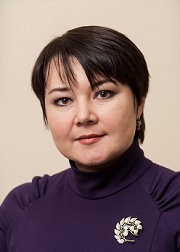TKACHENKO, A/Prof Victoria
Ukraine - Family Doctor

What work do you do now?
I am an Associate Professor of Family Medicine Department at Shupyk National Medical Academy of Postgraduate Education. My duties include conducting educational, scientific and medical consulting work.
As a teacher I give lectures, hold seminars, and conduct training in skills for family medicine residents and for qualified general practitioners as part of their continuing education. I am a mentor of clinical General Practice residents and those undertaking clinical masters.
Also, I am the main specialist in family medicine in of the Kiev regional department of health care. I am in close contact with the general practitioners of the Kiev region, helping them with their organisational, educational and clinical problems; and organising monthly mini-conferences and workshops on different topics of family medicine; organised the celebration of World Day of Family Doctor since 2015 in our region (the first time in Ukraine).
My research interests are the quality of primary care, the development and implementation of national protocols, quality indicators, and diabetes care. I participate also as a co-researcher in several international studies EUROASPIRE IV and V, ATTENTETIVE, STANTETTIVE
My practical consultative work takes place on the basis of our Department of Family Medicine in the Kiev Regional Clinical Hospital. I consult patients with diagnostic difficulties as a specialist in general practice at the request of other doctors. Also, I'm partly employed in a private clinic.
Other interesting things you have done?
In Ukraine, I try to be active in the development of family medicine. Now there is another wave of active health system reformation in Ukraine and I am a co-author of one of the Ukrainian Laws about primary care based on family medicine. Also I am a Council member of the board of the Ukrainian Association of Family Medicine.
I actively participate in WONCA activities and conferences. I coordinate the Ukrainian movement of young general practitioners and we try to participate in Vasco da Gama movement (VdGM) exchange programs.
I am a member of EURACT and improve my educational skills by taking part in EURACT training and reading their materials, and through communication with European colleagues. I try to implement my acquired knowledge in my work, especially new teaching methods, for example problem-oriented, case-oriented education, and interactive workshops.
My list of published works consists of more than 300 publications, about 70 of which are in English. The great honour for me is to be one of the invited authors of the WONCA’s World Book of Family Medicine, European edition.
As a researcher, I received my PhD degree in 2007, and in 2016 I became the first person in my country to receive a doctorate in Medical Science in General Practice - Family Medicine. This opportunity to be an official researcher in the field of family medicine was given to Ukrainian family doctors officially in 2010, thanks to the petition of my mentor and president of the Ukrainian Association of Family Medicine at that time - Prof G.I. Lysenko. I am pleased and honoured that despite the death of my mentor in 2013, I was able to finish the research. Every year I hold a regional conference in memory of my mentor and the founder of family medicine in Ukraine - Prof Lysenko.
I am involved in European medical organisations for example EURACT and I am also a member of EQuiP and EGPRN. I am also involved in collaboration with the local WHO Bureau.
What is it like to be a family doctor in your country?
Over the period 2011-2013, the Ukrainian health system reforms saw the formation of primary care centres. Unfortunately, since 2014, with the onset of the antiterrorist operations in the east of Ukraine, the reform has been suspended, and the centres have remained not fully equipped - general practitioners were not provided with computers, and our medical records are paper based, which makes our work difficult and takes a lot of time, especially when creating reports and monitoring quality indicators.
Since 2014, the standard of living in our country has decreased substantially, and all additional surcharges have been banned due to the economy of funds for antiterrorist operations, salaries as compared to inflation have decreased by 3-4 times, and the prices for food and communal expenses have increased. Right now the salary of young doctors is under 100 euros per month, and for doctors with experience it can reach 200 euros.
In addition to economic issues, we have also begun to face organizational and health problems with migrants from the east and the Crimea, the problems of post-traumatic stress syndrome, mental disorders, depression, and cardiovascular problems to a greater extent than before.
The next wave of reforms, which will begin in 2018, provides for the transition to a health care system like in Great Britain. Computerization, implementation e-Health, ICPC, introduction of a capital rate for the patient and fund holding by the family doctor are forecast, which, as promised, will make it possible to improve the condition and quality of the family doctor's work and their socio-economic status.
What are your interests inside and outside work?
I study languages, to improve my level of English - watch English language movies and read books in English. I have started to learn French. I like to travel and discover new countries and cities and explore their culture. In addition, after graduating from music school as a child, I try to maintain my piano playing skills. I like to embroider, especially traditional Ukrainian ornaments, as my grandmother taught me. I enjoy going to the theatre, spending time in nature, with friends and family.